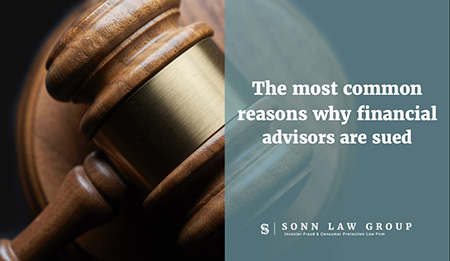Can I Sue My Financial Advisor?
Can you sue your financial advisor? Yes, you can. You can file an arbitration claim to seek financial compensation when an investment advisor, stockbroker, or brokerage firm fails to comply with FINRA’s rules and regulations, and you lose money as a result. The next question is, do you have a valid claim?
We place a great deal of trust in the financial advisors who are tasked with helping us achieve and maintain financial security. Most of the time financial advisors and stockbrokers are honest folks who work diligently in their client’s best interests.

However, on occasion financial advisors and the brokerage firms who employ them mess up and cause serious financial harm to their clients. Sometimes these losses are caused by simple negligence. Other times fraud or other serious misconduct is to blame.
After experiencing major negative events in their investment accounts, folks like you naturally wonder whether they can sue their financial advisor in an effort to recoup their losses.
In this article we’ll help you understand whether you have a legitimate chance of financial recovery by answering the following questions:
- What are the most common grounds for suing a financial advisor/broker?
- What must be proven to successfully recover damages?
- Did I sign an arbitration agreement and what does that mean for my case?
Our Advice: If you’re considering legal action against an investment advisor, it is imperative that you seek professional legal guidance. Do not file your claim alone. At Sonn Law Group, our dedicated securities fraud lawyers will review your claim for free, explain your legal options to you, and determine exactly what steps must be taken to get you the full compensation you deserve.
Have You Suffered Investment Losses?
Discuss your options with an attorney at Sonn Law Group
Get a Free Consultation Online
Or, call us anytime at 305-912-3000
The Most Common Reasons That Stockbrokers and Financial Advisors Are Sued

Stockbrokers and financial advisors fail to live up to their professional duties in a variety of ways. In some cases, investor lawsuits and arbitration claims involve allegations of outright theft or forgery of documents.
In other cases, negligent brokers steer an investor’s money into risky, inappropriate (unsuitable) financial products in order to obtain higher commissions.
Our law firm handles all types of investment fraud and broker negligence claims. Some of the most common examples of cases that we see include:
- Breach of Fiduciary Duty: Under the Investment Advisers Act of 1940, certain investment professionals, known as registered investment advisors (RIAs), owe fiduciary obligations to their customers. Your RIA must always look out for your best interests. If you lost money because of your RIA’s breach of fiduciary duty, you may be entitled to compensation for the full value of your damages.
- Unsuitable Investments: Many financial advisors are not fiduciaries. Instead, they are held to the suitability standard. These stockbrokers and financial advisors can only sell and recommend financial products that are appropriate for a customer’s unique investment profile. If you lost money in unsuitable investments, you should consult with an attorney immediately.
- Material Misrepresentations or Omissions: Brokers have a duty to make fair and honest representations to their clients. If they fail to do so, and an investor loses money due to a misrepresentation or a material omission, the broker may be liable for the investor’s losses.
- Lack of Diversification: Brokers must also act with the appropriate level of professional skill. Pushing a customer into over-concentrated investments is highly risky. Brokers can be held liable for losses sustained because of an investor’s inappropriate lack of diversification.
- Excessive Trading (Churning): Stockbrokers and financial advisors must have a well-grounded, reasonable basis to execute all trades. Unfortunately, there are cases in which brokers will frequently trade on a customer’s account, simply to increase their own fees. This unlawful practice is known as churning.
- Unauthorized Trading: Brokers must have the proper legal authority to make transactions on behalf of a client. If you lost money because your broker made trades that you never approved of, you may have been the victim of unauthorized trading. You should consult with an experienced attorney.
Successfully Suing Your Broker: Proving Fraud or Negligence
If you have lost a large amount of money in an investment, you know how awful it feels. It is stressful, frustrating, and worse yet, it can be financially ruinous. It is also right that the responsible party is held accountable. However, under U.S. federal securities law and FINRA regulations, investors cannot hold brokers legally liable simply because they lost money.
In order to prevail in an investment fraud lawsuit or FINRA arbitration cases, an investor must be able to assert a viable ‘cause of action’.
In the simplest of terms, an investor must be able to prove that their financial representative committed fraud or acted in a negligent manner and that there is a connection between the fraud or negligence and the investor’s financial losses.
There are certainly some cases in which financial advisor fraud or stockbroker negligence is clear and obvious. However, most investment fraud claims are highly complex. To prove fraud or negligence, investors should work with an experienced attorney who can help them carefully assemble all of the documents, records, and evidence together into a compelling, persuasive legal case.
Your Investment Agreement May Contain an Arbitration Clause
In many cases, investors are not technically eligible to file a lawsuit against their stockbroker or financial advisor. This is because the overwhelming majority of modern investment agreements contain mandatory arbitration provisions.
If there is a pre-dispute arbitration clause within the agreement that you signed with your broker or brokerage firm, it will almost certainly be enforced. This means that you will be required to seek compensation through the FINRA arbitration process. The good news is that FINRA arbitration is much like a mini-trial.
If your arbitration claim is successful, you may be issued a FINRA arbitration award that includes financial compensation for the full value of your losses.
While the FINRA arbitration process is somewhat similar to traditional litigation, there are also some very important differences. If you are filing a FINRA arbitration claim against a bad broker, you should be sure to work with a qualified investment fraud attorney who has deep experience with the intricacies of FINRA’s rules, regulations, and filing guidelines.
Contact Sonn Law to Get an Answer as to Whether You Can Sue Your Financial Advisor
At Sonn Law Group, our law firm is committed to helping investors recover full and fair financial relief for their losses. If you were a victim of stockbroker fraud or financial advisor misconduct, we are here to help.
To arrange a free, no strings attached case evaluation, please do not hesitate to contact our law office today. We handle all broker fraud and broker negligence claims on a contingency fee basis — our attorneys only get paid if we help you obtain financial compensation.
Can I Sue My Financial Advisor Over My Investment Losses in the 2020 Stockmarket Crash?
YES. Customers may well have a case against their financial advisor for many reasons, such as:
- Unsuitable investment advice: If your advisor recommended a portfolio that was not suitable for you based on your age, present income, net worth, investment objective, risk tolerance (conservative, moderate, moderately aggressive or aggressive) and any other material factors, then you very well may have a claim for damages.
- Concentrated investments: Losses from concentration occur when a customer has too many investments in one sector (oil, airlines, cruiselines, hospitality, gambling) or when they have just too much money in too few investments or a few stocks.
- Margin Losses: The use of margin is very dangerous, and can cause large losses or even a complete loss. No advisor should recommend the use of or holding investments on margin if the customer does not have sufficient cash in a separate account that they can use to meet a margin call.
- Failure to Execute a Sell Order: Many customers have called us and said that they told their advisors they were nervous, to get them out of the market, and the advisor kept recommending against a sellout until the customer gave up asking to sell. Advisor should respect a client’s right to sell, and respect any change in a customers’ tolerance for risk, such as when a client wants to cut their losses short. The stock market crash may not be over, and could be deeper and larger than it is right now. Advisors are subject to a claim for failing to heed a customer’s desire to sell their investments to stop the losses. Remember, if a customer loses 50% of their portfolio value, it takes a 100% return to get the portfolio back to its original value.
- Options: Like Margin, Options are dangerous and not for the average investor. Options are for short term trading, market timing, hedging, or just speculation.
Call Sonn Law Group at 305-912-3000 for free evaluation or send your email to jsonn@8zl.e54.myftpupload.com. No Recovery. No Fee. Case costs will be incurred and are reimbursed on any recovery.
